Spring/Summer 2019
September 1
Thank you to all of our Wasaga Beach piping plover volunteers! All of your hard work is appreciated!
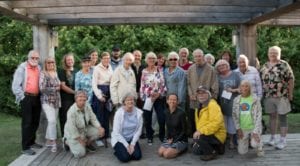
Piping plover volunteer appreciation night
Local Update: One of our chicks was presumed missing earlier this season. It was positively identified on its wintering grounds in Broward County, Florida on August 28! Wasaga Beach had a total of six fledged chicks in 2019!
Great Lakes region totals:
This season there were 71 pairs and 81 nests across the Great Lakes region. The region fledged a total of 92 wild chicks and 22 captive reared chicks.
July 31
Our five plover fledglings are still busy on the beach and shoreline in Ploverland. Often Alfonso, our Allenwood male, can be seen with them. He has lost his breeding plumage and looks much like the fledglings.
Banding helps to identify individual birds in both their breeding and wintering grounds. For example, Pepa (Nest #2 2019 Wasaga Beach), with her unique colour bands, is able to be tracked as she travels from Ontario to Florida and back. Here is the history of Pepa:
2012: Hatched Sauble Beach, ON; originally banded as X,O/B:-,-
2013: Tawas State Park, Michigan
2014: Tawas State Park, Michigan in spring; then renested Sauble Beach
2015: Au Sable Point, Michigan; nest
2016: Nest 1 Wasaga Beach (3 chicks fledged)
2017: Nest 3 Wasaga Beach (1 chick fledged)
2018: Nest 2 Wasaga Beach (4 chicks fledged) – resighted Pinellas County, FL (08/10/18)
2019: Nest 2 Wasaga Beach (4 chicks fledged) – resighted FL July 2019 (one of the first Great Lakes plovers reported wintering)
July 20
Our fiercely protective father, Worsley, is the last remaining adult in Ploverland and his brood of three has expanded by two now that Doc and Peppa have migrated. Do not be surprised if you see Worsley hanging out with all five chicks in Ploverland this weekend.
With plenty of eyes searching for our birds, we can confirm that Peppa has safely arrived in Florida. Fingers crossed that Nancy, Doc, and our two plovers from Allenwood (Alfonso and Piper) are not far behind.
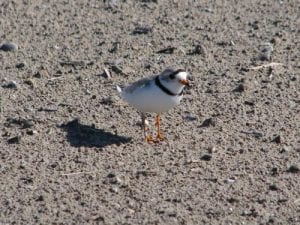
(c) Neal Mutiger
Ontario Update:
Darlington Provincial Park- After two failed attempts, the Darlington plovers (including a Wasaga Beach alumni) have three chicks
Sauble Beach- two chicks fledged
July 10
A Great Lakes Piping Plover update. Our plovers are part of a larger population, called the Great Lakes Piping Plovers. There are three populations in Canada, the Great Plains population, the Great Lakes and the Atlantic Coast. Our birds are a separate sub-species from these other two populations.
This year, as of July 1, in the Great Lakes, there are a total of 70 pair and 76 nests. Of these nests, 52 are active and 16 are being incubated. At the rearing captive centre, in the United States, there are 11 chicks and 10 eggs. These numbers do not add correctly due to captive rear broods and subsequent renests.
Great Lakes nest locations:
Michigan: 51 nests/rear broods
Illinois: 1 nest
Pennsylvania: 1 nest
New York: 1 brood of chicks
Wisconsin: 11 nests
Ontario: 6 nests/broods
Sauble Beach update: one chick was predated, two remain
July 8
Our five chicks are considered to be fledged! Bird Studies Canada considers a chick to be fledged at 23 days of age. As our chicks all hatched over Father’s Day weekend, we have reached that 23 day milestone. At this point the chicks are able to sustain a short distance flight.
July 4
After waiting a few days and recounting our plover chick numbers many times, we are saddened to let you know that one of Worsley and Nancy’s chicks was likely predated by a crow. The remaining chicks are growing well and can be seen running about on the beach and shoreline feeding.
June 24
All six of the Wasaga Beach Provincial Park Piping Plover chicks were banded successfully early this morning! The weights of the chicks ranged from 12grams to 17 grams.
A recap of our nests for the season follows: Nest 1, all four chicks hatched; Nest 2, two eggs hatched (no predation); Nest 3, nest not successful due to high water and pair did not re-nest successfully; and Nest 4, four eggs predated by a small mammal and the pair did not re-nest successfully.
Piping Plovers also nested this year at Sauble Beach. Out of two nests there, five chicks are surviving. A pair also nested at Darlington Provincial Park. High water washed their nest away.
June 23
A view of the plover exclosure/perimeter fencing. Thank you to St Noel Carbanel Elementary School in Wasaga Beach for their Piping Plover signs this year!
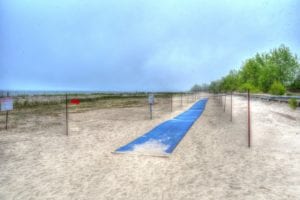
Perimeter fencing and mobimat; Image Neal Mutiger
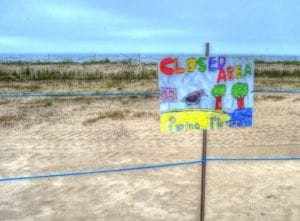
June 19
Ploverpalooza, which celebrated Piping Plovers this past Sunday in Beach Area 1, was a success! We are glad so many people came out to see and learn about Piping Plovers and to get involved in our games and activities.
Unfortunately, over the past few days, Salt and Peppa’s final two eggs did not hatch. The eggs are collected and will be sent to the University of Guelph for examination. Wasaga Beach has a current total of 6 piping plover chicks.
A portion of Allenwood Beach remains closed despite Alfonoso and Piper not being seen, as there are fresh Piping Plover tracks and indications of nesting activity in the enclosed area!
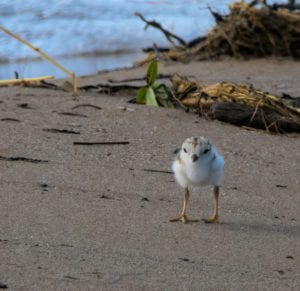
Piping plover chick on the beach; Image Neal Mutiger
June 16
Salt and Peppa’s chicks arrive in time for Father’s Day! Two of the pair’s chicks were observed hatching late in the day yesterday. The final two should hatch within twenty-four hours of the hatching of the first chick. Chicks gain 60% of their weight within their first three weeks of their life. It is important not to disturb the chicks while they forage for small invertebrates (sawflies, ants, bees, beetles) along the shoreline.
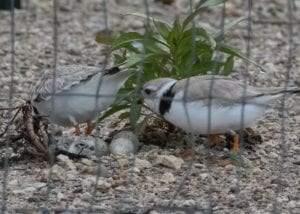
A newly hatched Piping Plover chick; Image Neal Mutiger
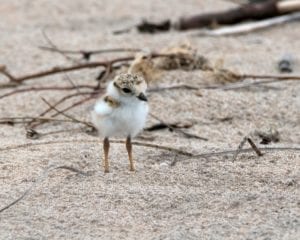
Piping Plover chick; Image Neal Mutiger
June 15
The chicks are busy feeding, brooding and running on the beach today.
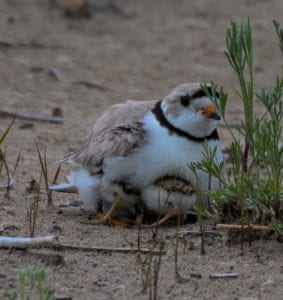
Brooding Piping Plover chicks; Image Neal Mutiger
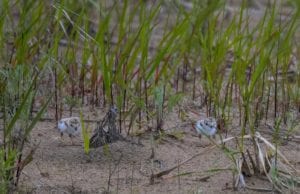
Piping Plover chicks on the move; Image Neal Mutiger
June 14
The eggs hatch! Worsley and Nancy are parents again! By noon today two chicks had hatched and the other two were soon to follow. The chicks were running and feeding themselves within a few hours, but won’t be able to regulate their body temperature for about a week. The chicks will often be seen huddling with their parents to stay warm. Please keep in mind that these images have been taken with a telephoto zoom lens on a camera and that the adults and chicks still require their space.
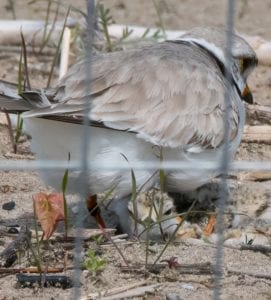
Piping plover and two newly hatched chicks; Image Neal Mutiger
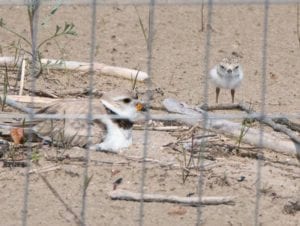
Piping plover adult and chick; Image Neal Mutiger
June 10
A recap of the season while we wait for the eggs to hatch:
Nest #1 – Worsley and Nancy (nest nearest to the volunteer hut, west end of Beach Area One); chicks expected soon!
Nest #2 – Doc and Peppa (nest mid Beach Area One); chicks expected soon!
Nest #3 – Flash and Tweety (nest eastern end of Beach Area One); we are awaiting eggs after the loss of some eggs due to high waters!
Nest #4 – Alfonso and Piper (Allenwood Beach), 4 eggs were predated upon by a small predator. We await a new nest with our fingers crossed. The area around the nest remains closed as the pair may nest again in the same location.
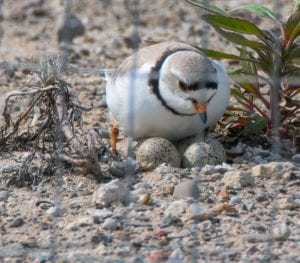
Piping plover and eggs; Image Neal Mutiger
May 28
Our plovers are busy incubating their eggs! See the three nests below and notice their similarities and differences! As of May 24, there are six known piping plover nests across Ontario, with three Wasaga Beach Provincial Park, two at Sauble Beach and one at Darlington Provincial Park.
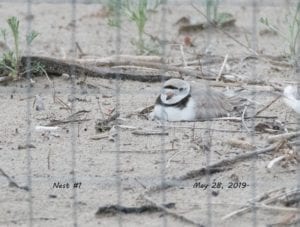
Piping Plover Nest #1, Wasaga Beach Provincial Park; Image Neal Mutiger
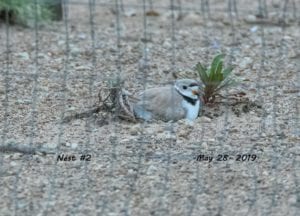
Piping Plover Nest #2, Wasaga Beach Provincial Park; Image Neal Mutiger
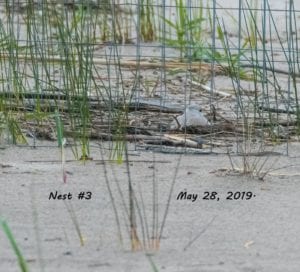
Piping Plover Nest #3, Wasaga Beach Provincial Park; Image Neal Mutiger
May 20
With active nesting in Beach Area 1, visitors to the beach will find sections of the beach temporarily closed to the public. The closure provides a secure location for the piping plovers to continue with nesting activities and incubating duties. Both adults in a pair will incubate the eggs, taking turns while alternatively foraging for food along the shoreline. You can help be a steward for these endangered birds by staying to the outside of the closed area. The closed area is marked with perimeter fencing and educational signage. Please keep food away from the area and use garbage cans as food can attract gulls, which are a predator to plover chicks. There are many volunteers that can be located around the closure that will share information about the birds and their habitat. They will also assist you with trying to locate the birds with binoculars and spotting scopes!
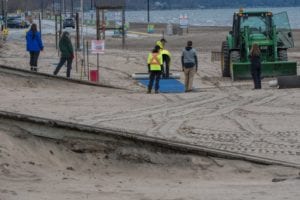
Preparing to put up the temporary piping plover exclosure; Image Neal Mutiger
May 16
We now have three pairs of Piping Plovers battling for territory! Confirmed as a pair in Beach Area 1 are Worsley and Nancy, who have re-established their pair-bond from last season. Our second pair of the season includes Peppa from 2018, recently paired with a new male named Salt. Her previous mate has not return to Wasaga Beach. Lastly, a potential third pair is currently displaying courtship behaviour and we eagerly await the discovery of their nest. Once an egg is laid, a mini-exclosure is placed over the eggs to protect them from predators. Female plovers will lay four eggs, with one being laid every other day until all four are laid. We are excited to announce that another female at the site is Tweety, which means that all three females from last season have returned for the start of 2019.
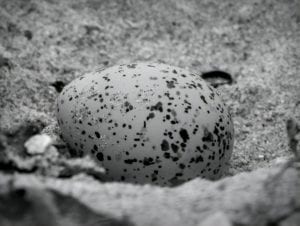
Piping plover egg; Image Neal Mutiger
May 6
Calling all volunteers! We are looking for both new and returning volunteers to help with our 2019 Piping Plover Recovery Program. As a volunteer you will be involved in sharing information about the birds with the public, monitoring bird behaviour and spreading stewardship messages about our beach. Interested and returning volunteers please visit http://pipingplovervolunteers.blogspot.com/ for more information.
Please click here, through Bird Studies Canada, to register as a Piping Plover Volunteer: http://www.birdscanada.org/news/piping-plover-volunteers-ontario Both new and returning volunteers must register through the Bird Studies Canada website (via above link). Once registered, you will be contacted by Wasaga Beach Provincial Park’s Beach Stewardship Coordinator prior to beginning your volunteering. All volunteers will be required to attend either one of the two training sessions at Nancy Island Historic Site:
May 24 from 5:30pm-7:30pm
June 9 from 1pm-3pm
May 4
Mating has begun! Prior to mating, the male will make a nest scrape in the sand using his feet and body. Sometimes shells or rocks are placed in the nest. Once the scrape is decided to be perfect by the female piping plover, which she decides by sitting and moving around in it, she exits the nest and walks around while the male does a mating dance. The dance looks like high stepping, or marching, on the spot! When the mating dance is over, mating proceeds!
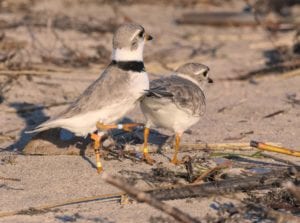
Piping plover mating dance: Image Neal Mutiger
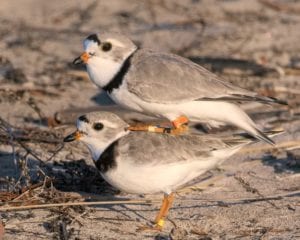
Piping plovers about to mate; Image Neal Mutiger
April 30
Our first male plover of the season, Worsley, has arrived! With his arrival, the piping plovers are busy chasing each other to mark territories, testing nest scrapes, doing mating dances and taking quick flights around the area.
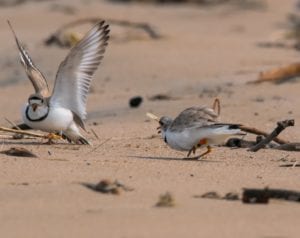
Piping plovers marking territories; Image Neal Mutiger
April 28
We have five female piping plovers! Tweety, Peppa, and Nancy have all returned to our shores. We also have two females with bands that show that they have nested at Sauble Beach. Now, we just need some males! Last year’s young always leave the wintering grounds last. Hopefully some males will be on the way soon.
The past few days have been wet and snowy. The plover nesting area has been wind blown and flooded. Piping plovers are resilient and stay warm by taking shelter behind driftwood and amongst the vegetation.
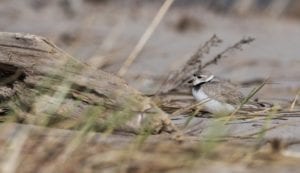
Piping plover protected from the wind; Image Neal Mutiger
April 22
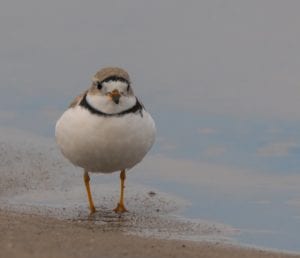
Female piping plover; Image Neal Mutiger
Wasaga Beach welcomes Ontario’s plover of the season – a lone female!
